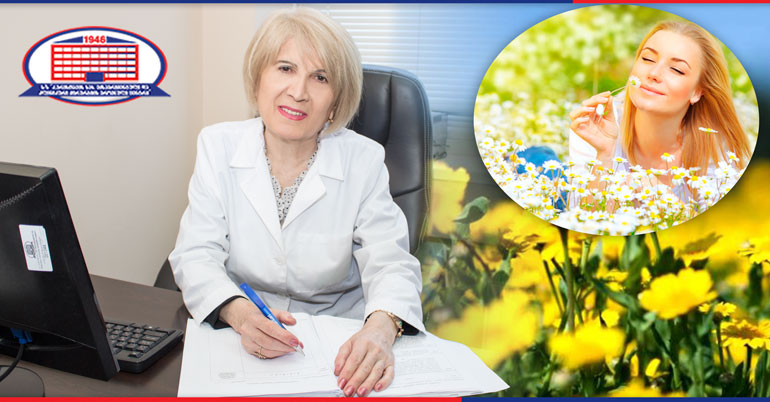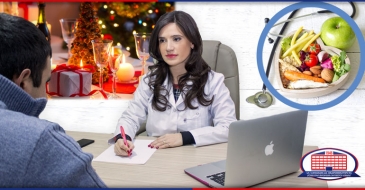
According to the modern approach, allergy is an anomaly of immune, protective mechanism of our body.
An allergen is a substance that causes an allergic reaction. Immunity is an indicator of protection or stability against the disease, and allergy is an immune reaction that is accompanied with the damage of our own tissues. The inflammation of the hyperemic nature, swelling, bronchospasm, skin itching, shock, is developed, which is manifested with different reactions.
Allergic diseases are : allergic reaction to medications, food allergy, anaphylactic shock, serum sickness, urticaria and Quincke's edema, contact dermatitis, erythema multiforme, allergy to latex, allergy to insect, autoallergy, allergic diseases of lungs, pollinosis (hay fever), atopic dermatitis, allergic contact dermatitis.
These diseases often appear in the acute form and require hospitalization. This type of patient often visits the National Center of Surgery.
Because this issue is very important in spring, we addressed to the allergologist of the National Center of Surgery Dr. Tina Muradashvili.
Dr. Tina tells us about the seasonal allergies and its symptoms.
If you have seasonal allergies, please, visit our clinic, which is multi-field and is functioning for 24 hours.
Pollinosis
Pollinosis is caused by dust particles. It develops seasonally - in an established period of time (from February to November), it is a chronic, recurrent allergic disease, primarily causes the damage to the eye and upper respiratory mucosa. One of the most common manifestations of pollinosis is conjunctivitis. It starts with a slight itching and a burning sensation in the corner of the eye. Itching spreads to upper and lower eyelids, swelling, hyperemia, watery eyes, feeling of a foreign body in the eyes, fear of light (photophobia) develops.
The main manifestation of pollinosis is rhinitis, sinusitis, and conjunctivitis.
A severe complication of pollinosis is asthma. During the exacerbation of pollinosis, people often complain about the periodic pain in the abdominal area, increase or decrease in arterial pressure, damage to the gastrointestinal tract, general weakness, drowsiness or insomnia, sweating, headaches, nervous system dysfunction, etc
Rhinitis
During rhinitis, the patient has a difficulty breathing through nose, nasal itching, nasal discharge, a frequent sneezing (sneezing attacks). It is noteworthy that rhinitis in pollinosis is more intense during the night. Symptoms of rhinitis include difficulty breathing through nose, anxiety, sleep disturbances, loss of the sense of smell.
It might be complicated with sinusitis (maxillary sinusitis, frontal sinusitis) this process may become purulent.
Sun allergy
The photoallergy is an allergic reaction caused by sunlight. The symptoms of the disease are skin redness, itching, rash, crusting, development of bumps and rough skin on the face, limbs and chest area. Urticaria and eczema may develop.
Insect Allergy
It is an allergic reaction caused by the contact with various insects that can even lead to death. Pain, swelling, hives, itching may develop at the site of the bite, which is local and lasts for 24 hours. An anaphylactic reaction is relatively rare. The following symptoms may also develop shortness of breath, general weakness, anxiety, abdominal pain, loss of consciousness. Symptoms develop within 10-15 minutes or later.
Food Allergy
Foods allergy may be caused by: milk, eggs, fish, butter, flour, buckwheat, oatmeal, barley, rye, walnuts, hazelnuts, peas, fava bean, soybean, almonds, coconuts, melon, bananas, chocolate, alcoholic beverages, strawberries, food additives and aromatic substances, citrus.
Most important is strawberries!
Food allergy is usually expressed as the typical symptoms of gastritis, such as epigastric pain, heartburn, nausea, vomiting, loss of appetite, skin rash, urticaria, angioneurotic edema, eczema.
Bronchial asthma
It is an inflammatory disease of the respiratory tract. The inflammatory process leads to rhonchi, feeling of suffocation, chest tightness, and the cough especially at night or early in the morning.
"Bronchial asthma is an endogenous, exogenous and mixed that is exacerbated in spring and allergen is to blame for the cause, which appears in the spring. The manifestation of bronchial asthma mainly occurs during the established period of time after the contact with the dust of the blooming flower, trees, plants, grass, mushroom spores. The symptom often manifest at night, " - says an allergologist.
Several golden pieces of advice from the allergologist of the National Center of Surgery:
• It is recommended that the allergic person should replace the furniture made by the soft texture of the fabric with leather one, and frequently air out a mattress ;
• Air your room early in the morning or late, because it is dusty outside in the noon;
• It is necessary to clean the windows and wipe the floor with a wet mop;
• The correct diet can resolve an exacerbated allergic reaction. Do not eat bitter, sour, tomato paste rich or fried food, and fish;
• Limit the maximum amount of following products: nuts, carrots, oranges, sunflower, mayonnaise, mustard, halva, chips, hamburger, sweet and soft drink - all products that contain conservatives.
• The following products are considered as a strong allergic food and drink: strawberries, tomatoes, coffee, chocolate, fish, oranges.
• It is desirable to eat porridge, pasta, vermicelli, soup, mashed potato, boiled meat;
• It is recommended to drink a large amount of mineral water and tea, no juice! Only a dried fruit, quince or apple compote is allowed;
• Avoid walking and exercising in the windy weather;
• Avoid the place full of plants;
• Avoid hiking in sunny days;
• Use glasses to protect eye from the sunlight;
• Cover the nose with the wet handkerchief;
• Use a respirator or protective mask while working in the garden;
• People bearing the risk, stay away from places where there are a lot of insects. Refuse to use cosmetics because the smell is very attractive to insects. Also avoid bright colored clothing.
National Center of Surgery address – Tbilisi, Digomi Chachava street N7.
You can contact the Call-center of the National Center of Surgery at (+995) 0322 02 25 25;
If you have some questions, you can contact the allergologist of the National Center of Surgery Tina Muradashvili at 577 11 86 43 or 599 14 45 87;
Wish you health!







